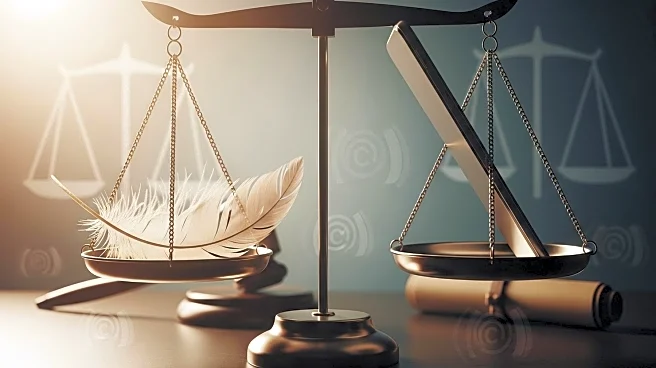What's Happening?
Anthropic, an artificial intelligence platform, has reached a $1.5 billion settlement agreement with a class of authors who accused the company of mass copyright infringement. The authors claimed Anthropic downloaded millions of pirated books for model training purposes. Despite the settlement being rejected by a district court judge as incomplete, Anthropic's willingness to settle indicates a shift in the balance of power between content owners and AI developers. The company, which recently raised $13 billion at a $183 billion valuation, could have continued litigation but chose to settle, possibly due to doubts about prevailing on its fair use defense. This decision aligns with recent shifts in copyright law, including the US Supreme Court's 2023 decision in Andy Warhol Foundation for Visual Arts v. Goldsmith, which has narrowed the scope of fair use exemptions.
Why It's Important?
The Anthropic settlement highlights a significant shift in copyright law, potentially favoring content owners over AI developers. This change could impact how AI companies approach the use of copyrighted materials, leading to more licensing agreements and negotiations rather than litigation. The narrowing of fair use exemptions may result in increased costs for AI developers who rely on copyrighted content for training models. This shift could also influence the broader tech industry, as companies may need to reassess their strategies for using copyrighted materials. Content creators and copyright owners stand to benefit from this change, as it may lead to better compensation and protection of their works.
What's Next?
If the Anthropic settlement is approved, it could set a precedent for future cases involving AI and copyright infringement. Other ongoing litigations between content owners and AI developers may be influenced by this case, potentially leading to more settlements and licensing agreements. The legal landscape for AI and copyright law remains in flux, and stakeholders will need to navigate these changes carefully. Courts and marketplaces will continue to debate how copyright law should adapt to the digital age, balancing the interests of content creators and AI developers.
Beyond the Headlines
The Anthropic case underscores the ethical and legal challenges faced by AI developers in using copyrighted content. As the fair use exemption narrows, developers must consider the implications of their actions on content creators and the potential harm caused by unlicensed use. This shift may prompt discussions on how to structure licensing and revenue-sharing arrangements that fairly compensate artists and entities contributing to the digital ecosystem. The case also highlights the evolving relationship between technology and copyright law, as courts reassess the balance between innovation and protection of intellectual property.









